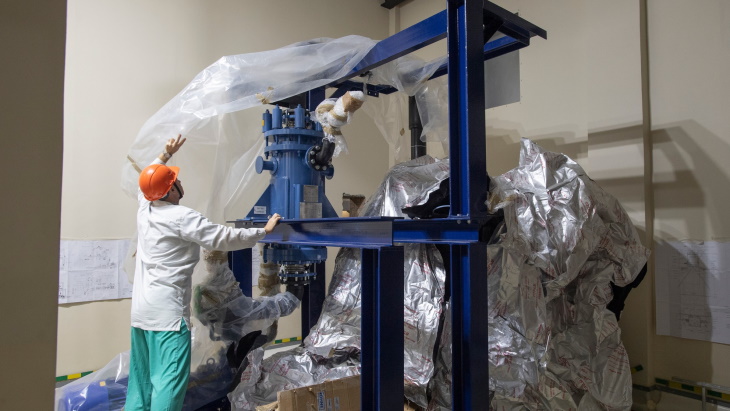
Equipment for the W2-EPC plant is unpackaged ready for installation (Image: TVEL)
The plant, with a processing capacity of 10,000 tonnes per year, is being supplied by Orano Projets - the engineering arm of France's nuclear fuel cycle specialist Orano - under a EUR40 million (USD44 million) contract signed in December 2019. Under the terms of the contract, Orano will supply the equipment for the construction of the deconversion facility, as well as providing technical assistance in its installation and commissioning. The first equipment for the plant arrived at the construction site in eastern Siberia from France in December 2021. The project was originally expected to be completed in 2022.
The W2-ECP plant will accept deliveries of depleted uranium hexafluoride gas (DUF6 - sometimes called DUHF) and deconvert these to uranium tetrafluoride, with anhydrous hydrofluoric acid being produced as a by-product. Deconversion transforms the toxic and somewhat corrosive gaseous DUF6 enrichment tailings into a stable powdered oxide form fit for long-term storage, transport or final disposal.
Work is now under way in parallel at all areas of the new production facility, TVEL said. "On the first floors of the already erected buildings, the installation of the electrical part began. The most dimensional equipment has already been installed in the building of the hydrofluoric acid acid processing unit," it said. "Acid will be supplied to this section from the DUHF defluorination unit, which is being built nearby - construction work is still ongoing there. The installation of the main equipment - furnaces and reactors - is scheduled for the end of 2023 (after the completion of construction work at the defluorination unit)."
ECP produces low-enriched uranium for nuclear power plant fuel assemblies, stable and radioactive isotopes of various chemical elements, and a number of other high-tech products.
Although depleted uranium is seen as a leftover material from the enrichment of uranium, TVEL noted that it could be used in the creation of mixed-oxide (MOX) uranium-plutonium fuel for fast reactors. The BN-800 fast reactor at Beloyarsk is gradually switching to MOX and the BREST-OD-300 reactor under construction at Seversk requires uranium-plutonium nitride fuel (known as SNUP).
The new W2-ECP plant represents an expansion on deconversion work at the existing W-ECP plant. With a joint capacity of 20,000 tonnes per year the two plants will be able to "stop the growth" of DUF6 stocks in Russia, said TVEL.
The W-ECP plant was supplied by Orano under a contract signed in 2005. The capacity of the plant, commissioned in December 2009, was increased from 5000 tonnes per year to 10,000 tonnes per year in 2011.
Rosatom's long term plan is then to increase its deconversion capacity with a third plant, W3-ECP, and progressively deal with all the DUF6 that has accumulated at TVEL sites. Achievement of this goal is slated for 2057.